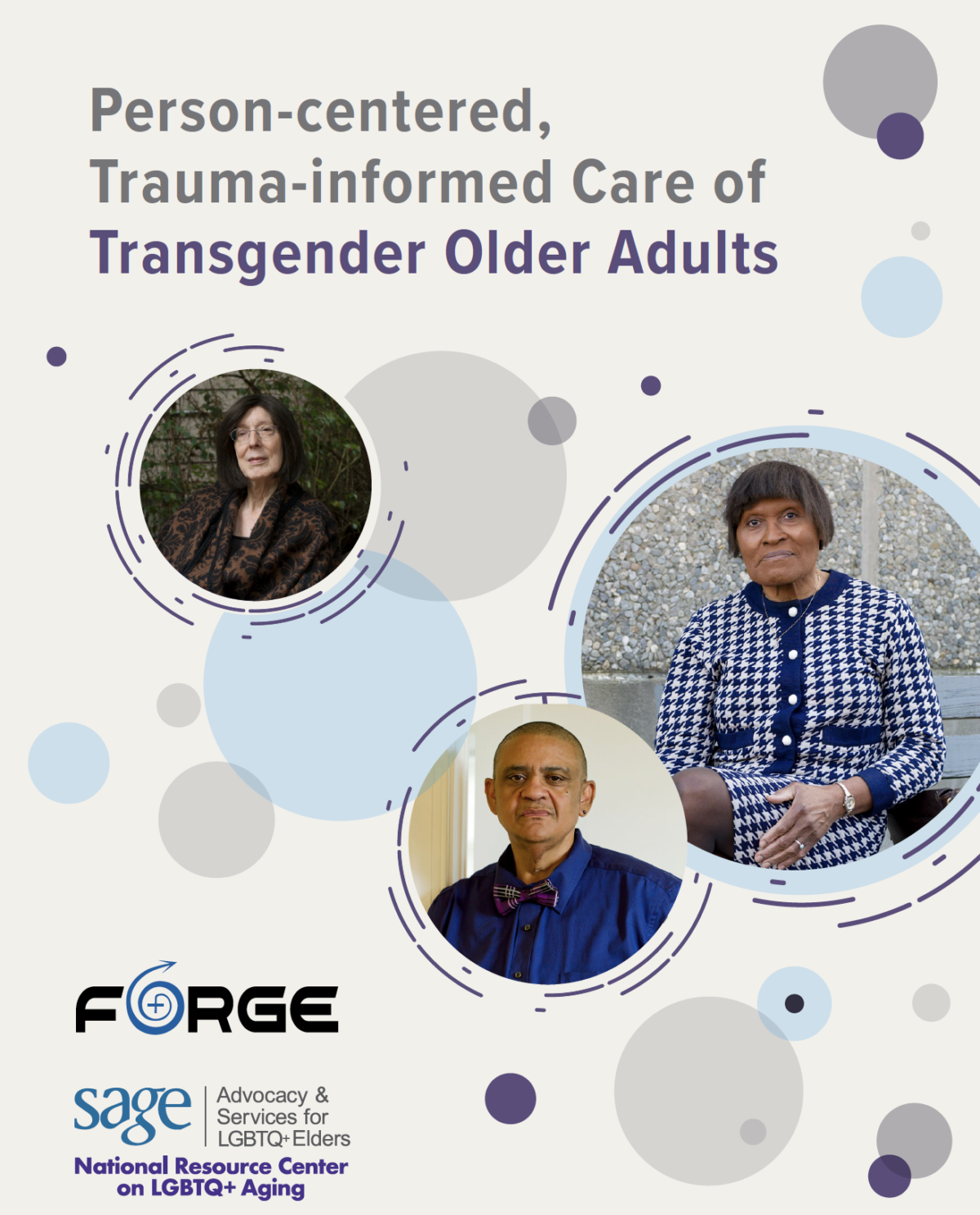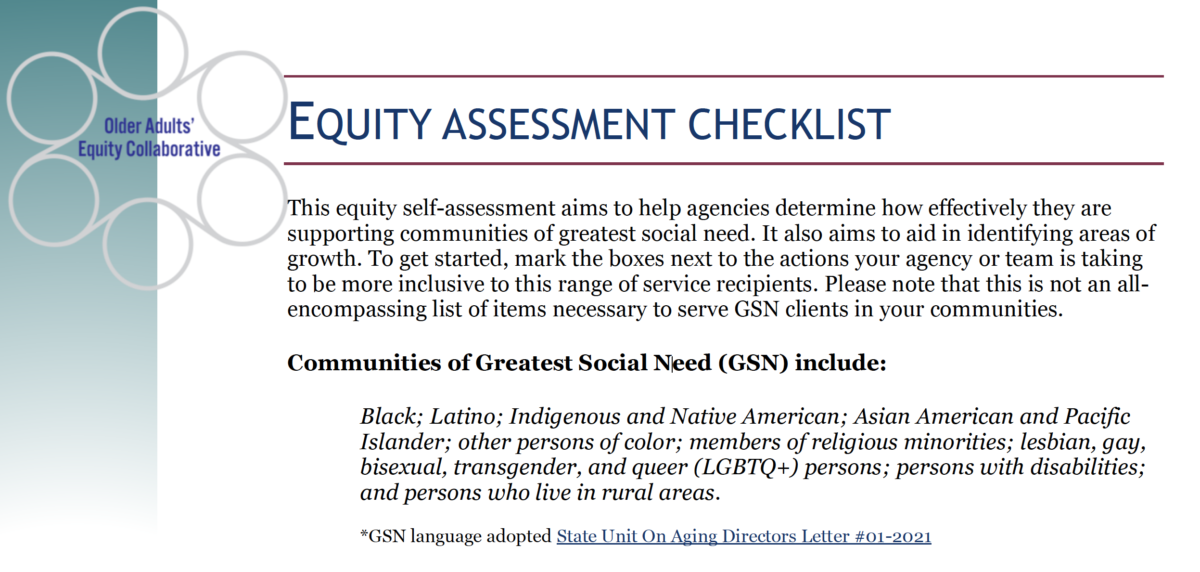This guide aims to explain the why and how of providing person-centered and trauma-informed care to transgender older adults in practical language. The concepts shared in this guide are useful for anyone working in health and aging services where a focus on individualized support is optimal for overall health and well-being.
Read More
This equity self-assessment aims to help agencies determine how effectively they are supporting communities of greatest social need (GSN). It also aims to aid in identifying areas of growth. To get started, mark the boxes next to the actions your agency or team is taking to be more inclusive to this range of service recipients.
Read More
Social isolation is defined as a lack of social connections. Social isolation can lead to loneliness in some people, while others can feel lonely without being socially isolated, according to the Centers for Disease Control and Prevention (CDC). These fact sheets provide insight and best practices for addressing social isolation among American Indian Elders.
Read More
Black and Aging in America© presents summaries, statistics, and perspective on the status of Older African Americans. By examining social, economic, health and other indicators, in comparison to other racial and ethnic groups, this report illustrates progress as well as the many challenges that remain.
Some organizations, academic studies, and government agencies consulted for this report define seniors as over age 55. However, unless otherwise noted, this report reflects information on the 65-and-older cohort. Black and Aging in America© condenses this broad spectrum of information into one simplified presentation—a readily accessible portrait of the status of Older African Americans.
Read More
On January 4, 2011, the National Alzheimer's Project Act (NAPA) (Public Law 111-375) was signed into law. The Act defines "Alzheimer's" as Alzheimer's disease and Alzheimer’s disease-related dementias (AD/ADRD) and requires the Secretary of the U.S. Department of Health and Human Services (HHS) to establish the National Alzheimer's Project to:
- Create and maintain an integrated National Plan to overcome Alzheimer's disease;
- Coordinate Alzheimer's disease research and services across all federal agencies;
- Accelerate the development of treatments that would prevent, halt, or reverse the course of Alzheimer's disease;
- Improve early diagnosis and coordination of care and treatment of Alzheimer's disease;
- Decrease disparities in Alzheimer's disease for racial and ethnic minority populations that are at higher risk for Alzheimer's disease; and,
- Coordinate with international bodies to fight Alzheimer's disease globally.
The law also establishes the Advisory Council on Alzheimer's Research, Care, and Services (Advisory Council) and requires the Secretary of HHS, in collaboration with the Advisory Council, to create and maintain a National Plan to overcome AD/ADRD.
Read More
Over the last 12 years, New York City has experienced multiple catastrophic events. The 2001 attack on the World Trade Center, the blackout of 2003, Hurricane Irene, and, most recently, Hurricane Sandy, posed significant challenges to older adults. A common denominator of these incidents was the loss of power and the disruption of systems and services upon which older adults rely, including but not limited to transportation, communication, health care, elevators, and social supports. As a result, tens of thousands of older adults were isolated in high-rise buildings and private homes, in need of food, water, warming or cooling, medical attention, and medication.
Read More
This resource was developed by MHP Salud with essential guidance and understanding about ADRD provided by Alzheimer’s Association – San Antonio and South Texas Chapter. It was created to bring information to service providers and caregivers about how dementia affects the Hispanic/Latino community.
Read More
The Salud Para Todos Implementation Guide is a comprehensive tool for Promotores de Salud (Community Health Workers), or other peer educators, to prepare and implement community education sessions on mental health topics. The Implementation Guide provides the information, session plans, and other materials needed to facilitate educational sessions the topics of mental health, stress, domestic violence, substance abuse, and the relationship between chronic disease & mental health. Please note: This toolkit is accompanied by a powerpoint presentation.
Read More
CHWs can help by addressing the stigma around mental health and encouraging the community to accept those facing emotional challenges. They can also use their resources to get people early care, reducing the negative impacts experienced by the individual, their family, and the community. Download this program manual for CHWs to strengthen their knowledge about mental health issues, coping mechanisms, and utilizing resources to help those suffering from mental health issues access the services available to them in their community.
Read More
This Guide provides health center staff with important resources, information, and tools to address the unique mental health needs of their Migratory and Seasonal Agricultural Worker (MSAW) patients. One of the most crucial resources we explore is the active role of Community Health Workers to bridge the gap between MSAWs and clinical care.
Read More

